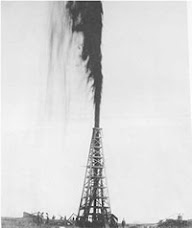
Why Oil & Gas E&P: Oil exploration and production stocks are important to every American who has discretionary income, because much of our non-discretionary income is spent on gasoline. If gasoline prices go up, you are hurt, unless you own oil stocks.
Oil stocks are your most important personal hedge: U.S. (domestic) E&P stocks are a good hedge against inflation, high oil prices, oil shortages, and a weak dollar. Some of you spend more on food than on gasoline, but I’ve never found a good way to hedge against high food prices.
In my view, oil stocks are a more important hedge than owning gold.
Peak oil or just short supply with high prices? I don’t know whether “peak oil” has occurred or if it will occur within the next few years. I do strongly believe that increased demand for oil and increasingly hard to find oil will result in higher oil prices. In my view, the peak-oil question is irrelevant to the decision to own oil stocks.
Domestic, Foreign, or Offshore? I focus only on U.S. onshore petroleum companies. Offshore (even in the Gulf of Mexico) is harder to analyze and more subject severe weather. Foreign exploration is harder to analyze, subject to political risk, war risk, and risk of sabotage.
Integrated versus E&P. The huge firm – like ConocoPhillips (COP) and Exxon Mobil (XOM) – are not oil exploration and production firms. They are huge, international conglomerates that are involved in refining, plastics, oil pipelines, natural gas-gathering systems, plastics, retail gasoline stations, credit cards, and a host of other things in many countries. Finding oil in the U.S. occupies less of their top executives’ time than does lobbying in Washington.
I generally don’t invest in super-large independent oil firms such as XTO Energy (XTO, market capitalization $26 billion) or Chesapeake Energy (CHK, MktCap = $17 Billion). They are too big to give much information on individual wells or lease holdings in various exploding oil fields. Also, these firms are natural gas heavy and oil light. I do study what they say, and they are potential takeover targets for the integrated oil firms. Exxon recently moved to acquire XTO.
Firms like Petrohawk (HK, MktCap = $6 billion) are about as big as I go.
Diversified portfolio versus accepting non-systematic risk. Except for cash, I don’t own anything but oil stocks. Yes, that subjects me to what professors call non-systematic risk. I bet on oil stocks and the professors bet on “the market,” as represented by the S&P 500 or the Dow Jones Industrial Average (DJIA). I am negative on the long-term prospects for the economy. Why should I invest in banks stocks, retail stocks, etc. when I think their long-term prospects are poor!?!
This focus allows me to actually learn something about the stocks I own.
Non-Technical Analysis: I am not a technician. All those graphs are pure gobbledygook to me.
Non-fundamental Analysis: I’m not a fundamentalist. I do not look at PE’s, try to predict earnings, etc. The only financial thing I look at for these small oil exploration companies is whether or not they can cover their CapEx E&P budget. Most of them are experts are predicting and adjusting CapEx to fit cash flow. I also do not look at proved reserves; the Wall Street geeks study this and I believe it is built into the price of the stock.
What I do Focus on: An oil company leases unique land, drills, and it either hits oil or it does not. If its new wells are excellent, the stock will go up. I focus evaluating their claims for leasing, discoveries, and production. Leasing and drilling are the blocking and tackling for oil companies.
I listen to all the management webcasts (often I listen to it twice) and try to evaluate management quality. Are they real oilfield guys or just promoters? In a webcast, they must handle themselves well, be knowledgeable, and honest. This is subjective.
For objective analysis, I study the firm’s “presentations” on their websites, and their press releases. They present past leasing and drilling success and their plan for the near-term future.

No comments:
Post a Comment